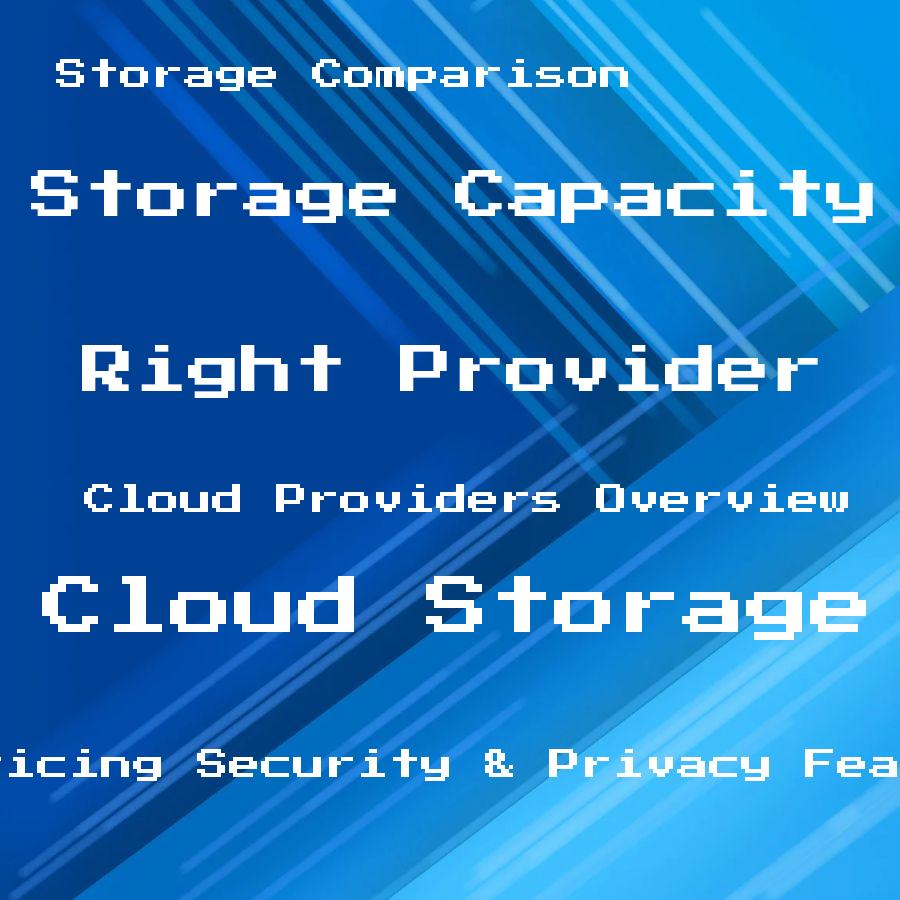Discover the perfect cloud storage provider for your needs by comparing top options in our comprehensive guide, ensuring a seamless and secure experience.
Are you tired of running out of storage space on your devices? Or maybe you’re looking for a way to securely store and access your files from anywhere? Cloud storage might just be the solution you need. With so many providers out there, it can be overwhelming to choose the right one for you.
That’s why we’ve put together this comprehensive comparison guide to help you make an informed decision. We’ll explore the top cloud storage providers, their features, pricing, and security measures so that you can find the perfect fit for your needs.
Let’s dive in!
Introduction to Cloud Storage

Cloud storage is a service that allows you to store and access your files, photos, videos, and other data over the internet. Instead of storing your files on a physical device like an external hard drive or USB stick, cloud storage providers offer remote servers where you can upload and download your data from anywhere with an internet connection.
This means that you don’t have to worry about losing important documents if something happens to your device or carrying around multiple devices just to access all of your files.
One of the biggest advantages of using cloud storage is its flexibility. You can easily scale up or down depending on how much space you need without having to purchase new hardware every time.
Most providers offer automatic backups so that even if something happens to one server location; there are always copies stored in other locations.
However, not all cloud storage services are created equal – some may be better suited for personal use while others may cater more towards businesses with specific needs such as collaboration tools or advanced security features.
Factors to Consider
First and foremost is the amount of storage space you need. Some providers offer free plans with limited storage, while others have paid plans that provide more space.
Another important factor is security and privacy features. You want to ensure that your files are protected from unauthorized access or data breaches.
Look for providers that offer encryption, two-factor authentication, and other security measures.
Ease of use is also an essential consideration when selecting a cloud provider. The platform should be user-friendly with intuitive navigation so you can easily upload and manage your files without any hassle.
Lastly, it’s crucial to think about syncing capabilities across devices as well as file sharing options if collaboration among team members or clients will be necessary in the future.
Top Cloud Providers Overview
However, not all of them offer the same features and benefits. In this section, we’ll provide an overview of some of the top cloud storage providers that you should consider when making your decision.
First on our list is Dropbox – a popular choice for individuals and businesses alike due to its user-friendly interface and easy-to-use file sharing capabilities. Next up is Google Drive – a great option for those who use other Google services such as Gmail or Google Docs since it integrates seamlessly with these platforms.
Another provider worth considering is Microsoft OneDrive which offers excellent syncing capabilities across devices running Windows 10 operating system while also providing access to Office 365 apps like Word or Excel online.
ICloud from Apple provides seamless integration with iOS devices but may not be suitable for users who require cross-platform compatibility between different operating systems like Windows or Android.
Storage Capacity & Pricing
Most providers offer a range of plans with different levels of storage capacity at varying prices. Some even offer free plans with limited storage space that can be upgraded as needed.
It’s essential to assess your needs before choosing a plan, so you don’t end up paying for more than what you require or running out of space too quickly. Consider the types and sizes of files that will be stored in the cloud, such as documents, photos, videos or music files.
Also keep in mind any future growth potential when selecting a plan; if your business expands rapidly or if personal data usage increases over time then upgrading may become necessary sooner rather than later.
Security & Privacy Features
After all, you’ll be entrusting your personal or business data to a third-party provider. That’s why it’s crucial to choose a provider that offers robust security measures and respects your privacy.
Most reputable cloud storage providers use encryption technology to protect your files from unauthorized access. This means that even if someone were able to intercept your data during transmission or gain access through hacking attempts, they wouldn’t be able to read the contents without the decryption key.
Many providers offer features such as two-factor authentication (2FA), which adds an extra layer of protection by requiring users not only enter their password but also provide another form of identification like a code sent via text message or email before accessing their account.
Privacy is equally important when choosing a cloud storage provider. You want assurance that no one else can view or share your files without permission – including the company itself! Look for providers with clear policies on how they handle user data and who has access rights in case there is any legal request for information sharing.
File Sharing & Collaboration
When choosing a provider, it’s essential to consider their file-sharing capabilities. Some providers allow you to share files via links or email invitations, while others offer more advanced collaboration features like real-time editing and commenting.
Google Drive is an excellent option for those who need robust collaboration tools. It allows multiple users to work on a document simultaneously, making it ideal for team projects or group assignments.
Dropbox also offers similar features but at a higher price point.
On the other hand, if you’re looking for simple file sharing without any bells and whistles, iCloud might be your best bet as it integrates well with Apple devices’ ecosystem.
When considering file sharing options in cloud storage providers make sure that they have adequate security measures in place so that only authorized individuals can access shared documents or folders.
Syncing Capabilities
With this feature, you can access your files from any device and keep them up-to-date automatically. This means that if you make changes to a file on one device, those changes will be reflected across all devices connected to your account.
However, not all cloud storage providers offer the same level of syncing capabilities. Some may only sync certain types of files or have limitations on how many devices can be synced at once.
When comparing providers, it’s essential to consider their syncing features carefully. Look for options that allow for automatic and continuous synchronization across multiple devices without restrictions or additional fees.
Customer Support
You want to make sure that you have access to reliable and responsive support in case anything goes wrong or if you have any questions about the service.
Some providers offer 24/7 phone and chat support, while others only provide email or ticket-based systems. It’s important to check what kind of customer service options are available before committing.
Another thing worth considering is the quality of their knowledge base and online resources such as tutorials, FAQs, forums etc., which can be very helpful for troubleshooting common issues on your own.
Third-party Integrations
This feature allows you to streamline your workflow by connecting different tools that you use daily, such as project management software or email clients. When choosing a cloud storage provider, it’s essential to consider which third-party integrations are available.
For example, if you’re using Google Workspace for your business operations, it makes sense to choose a provider that integrates seamlessly with Google Drive. Similarly, if you frequently collaborate on projects using Microsoft Office Suite tools like Word or Excel sheets, then OneDrive may be the best option for you.
Other popular third-party integrations include Dropbox’s integration with Adobe Creative Cloud and Box’s integration with Salesforce CRM software. By selecting a provider that offers these types of integrations can help improve productivity while reducing time spent switching between different apps.
Pros and Cons Comparison
Here are some key points to keep in mind:.
Pros:
- Most providers offer a free plan with limited storage space.
- Cloud storage allows for easy access and sharing of files from anywhere with an internet connection.
- Automatic syncing ensures that your files are always up-to-date across devices.
- Many providers offer advanced security features such as two-factor authentication, encryption, and remote wipe capabilities.
Cons:
- Depending on your needs, cloud storage can be more expensive than traditional external hard drives or USBs.
- Internet connectivity is required to access stored files which may not be ideal in areas with poor connectivity or during power outages.
- Some providers have file size limits which could pose problems if you need to store large media files like videos.
Choosing a cloud provider comes down to weighing these pros and cons against your specific needs. By doing so you’ll find the perfect fit for secure data backup while enjoying seamless accessibility from any device at any location!




